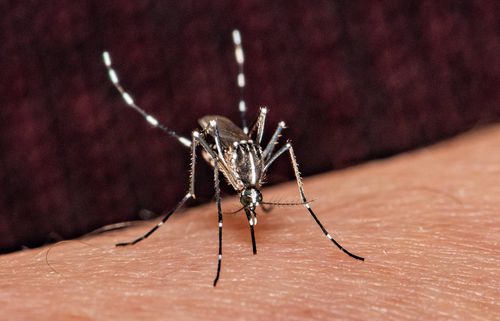Mosquito species that transmit dengue fever – travelers encounter them primarily in tropical regions in Asia, South America and Africa. But mosquitoes can also infect people in Europe, for example on the Portuguese island of Madeira. That makes it CRM Center for Travel Medicine attentive.
Several hundred to more than 1000 imported dengue infections are recorded in Germany every year. Almost every third person affected came back from a trip to Thailand.
Not every infection comes with symptoms
What symptoms should travelers and those returning from travel think about dengue? First of all: According to the CRM, only about every fourth infection is accompanied by symptoms of illness.
When she does, the illness often begins with a sudden, high fever. Other signs: body aches and headaches that are felt behind the eyes. There can also be flat skin rashes that look like sunburn.
According to Tomas Jelinek, scientific director of the CRM, the fever goes away on its own after four to five days. If it persists or runs in spurts, speak against dengue.
This also applies if symptoms only appear more than two weeks after returning from the trip. Because: The incubation period is usually four to seven days, in individual cases it can be longer.
With around one percent severe courses
In a small proportion of those affected – one percent, according to the CRM – severe courses occur. The reason for this is that the infection allows fine blood vessels to become permeable. This allows fluid from the tissue to enter the blood.
Warning signs for this are abdominal pain, persistent vomiting, shortness of breath or bleeding of the mucous membranes, for example the gums.
The CRM advises that you should pay particular attention to whether these symptoms appear around the fifth day of illness. If severe courses are left untreated, they can be fatal. Good to know: The first dengue infection rarely takes a severe course.
Here’s how travelers can prevent themselves
Anyone traveling to an area where dengue is transmitted needs good mosquito repellent. Travelers can protect themselves from bites by using repellents that are applied to the skin and keep mosquitoes away. Clothing also protects.
There are two vaccines against dengue fever – including one that is suitable for travelers. The European Medicines Agency EMA has that Vaccine Qdenga Approved at the end of 2022, for adults and for children over the age of four. The Stiko Standing Vaccination Committee is currently examining a possible vaccination recommendation for travelers to dengue areas. (dpa)

